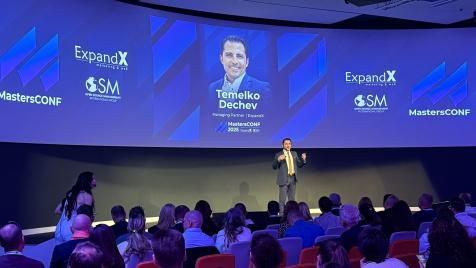40 Is the New 20 in Business
Entrepreneurs over 40 break the stereotypes of the startup community in Bulgaria and around the world

© ECONOMIC.BG / Pixabay
What is your first association when you hear the word “startup entrepreneur”? Perhaps a young man in his early 20’s, or maybe a woman, sitting in front of a laptop covered in accelerator stickers and drinking a huge coffee or a craft beer in a shared workspace... The young age of the new entrepreneurial community implies this idea, but outside of it remain many successful and edifying stories of people over 40, who jump into the unfamiliar waters of their first business alongside people who are yet to learn how to work.
A recent study by the American Duke University, Kauffman Foundation and Founder Institute found that the average age of the novice entrepreneur is 40 years, and that of the leaders of the fast growing startups - 45 years. The survey team relies on US statistics showing that the average age of people who start their own business is 42 years. Many of them are micro and small companies without expectations for rapid growth, but even for software starters, the average age is 40, and in the field of biotechnology, it jumps to 47. The data also shows that the companies with the highest growth in sales and the most successful initial public offering on the stock exchange are also managed by people who are over that age. “In other words, when you look at the most successful companies, you will notice that the age of their founders is rising with their better market performance. That is, successful entrepreneurs are not young, but rather middle-aged,” says the summary of such a study by Pierre Azoulay's team from the MIT Sloan School of Management.
Among the examples of successful middle-aged entrepreneurs are Donald Fischer, who opened the first clothing shop of the Gap chain at the age of 42, and Bernie Marcus, who founded Home Depot at 50. Steve Jobs presented the iPhone when he was 52, and Jeff Bezos achieved Amazon's biggest sales at the age of 45.
“People start their own business at all ages, this has always been the case, but the media love the stories of 18-year-old millionaires,” says Elitza Stoilova, the founder of the Umni chatbot company, with a smile. She started Umni in 2017 after she graduated from The Founder Institute (Season 3, Sofia) with a chatbot project for the hospitality sector. Her business is a continuation of her longterm career in the travel industry. “For 17 years at the Mariana Islands, I grew to become a general manager of a hotel. About two years ago, I returned to Bulgaria. This was also the moment when I thought about starting my own business,” she says.
Elitza Stoilova
The biggest challenge turned out to be the change in the employee-to-entrepreneur thinking. “An employee is a person who receives a salary. If you don’t like it - you get up and leave. An entrepreneur lives with their business. There is no beginning of the working day and there is no end. Mature people very often leave behind their back a solid career to start something from scratch, have greater responsibilities and obligations to their family, a certain standard of living, habits and relations. Starting your own business changes every aspect of your life,” she explains.
Dimitar Dimitrov, co-founder of Tickey, the company that introduced credit card payments for buying a ticket in the public transport in Bulgaria, also started his own business after a successful career as an IT manager in financial and consulting companies. The economic crisis of 2008 brought him back to Bulgaria. “The main drive to launch a startup was my participation, which happened almost as a joke, in an event called StartUp Weekend in April 2013. Then, I saw that there was an ecosystem of young and enthusiastic people who want to start their own business,” he remembers. Today, his most important lesson from the startup venture is that when you develop your own business without much financial support, you need to give more than 100% in order to succeed. “Unfortunately, most often it is your family and hobbies that suffer,” he adds.
Dimitar Dimitrov
Both Elitza and he claim that there is no age or gender discrimination in the IT sector, but the ideas, innovative thinking, knowledge and experience are more important. Dimitar says this is a sign of how open an ecosystem is. He adds that any innovation that frees us from the routine work and facilitates our lives can succeed.
According to Umni's creator, it can be expected the average age of the successful entrepreneurs to be 45 years - on the one hand, these people have experience, contacts, knowledge and intuition, and on the other - they are in the prime of their lives, they have a developed character and self-knowledge. Elitza says these are conditions for a higher probability of success. Dimitar adds that his age rather implies more trust and openness in the dialogue with most partners and investors who are his peers, and with whom he can communicate more easily.
They both cite as major differences with their younger colleagues the attitude towards work and towards the client. According to Elitza, young people are more direct in dealing with clients, but also more impatient in terms of operational processes. The founder of Tickey believes that he is more realistic in his assessments and expectations for both partners and consumers. And he adds that younger people are more aggressive and more persistent in pursuing their goals. Elitza also weighs more carefully the pros and cons of each decision and doesn’t risk easily. “But this is more a matter of experience and character, of a generation's style than of a difference in years,” she adds with a smile.
We continue our conversation with both of them with the question whether there is an optimal age for entrepreneurship. Elitza, as a true lady, diverts the topic by saying that this is a matter of thinking and action. Dimitar is more straightforward and says: “Somewhere after 35 years, because you've already gained enough experience and developed professionally, and at the same time, you still have enough energy to get out of your comfort zone and take upon a challenge.”
Our third interlocutor, Hristo Alexiev, from Playground Energy, raises the age for a startup to 60-70 years. He himself, along with his partner Ilian Milinov, founded their company for children's playgrounds and fitness equipment, which generate kinetic energy, after the age of 40 as well. This is his latest business venture, but also one of the riskiest. “We are young in this industry, but we have put on stake everything,” he says with a smile. He adds that their age suits them - both Ilian and he know where they are going. Unlike their previous businesses, they entered this one, as they admit, at the wrong time. In 2012, the idea of generating electricity from the movement on a climbing frame or a fitness gear sounded as fiction to everyone. The Bulgarian venture capital fund - Eleven, managed by younger entrepreneurs, financed them because they liked the raw idea. Later, the company also received support from the Springboard Acceleration programme in the UK.
Hristo Aleksiev
The new business project posed unexpected challenges to Hristo - to learn to present in front of 5 or 1,000 people, investors, business partners, clients or students. The so called “business pitch” and “speed dating” for investors are the new tricks that the “old dogs” had to learn. “We rehearsed for days in our office. Today, I can speak for 3, 5 or 15 minutes, according to the audience and the purpose. A president and several heads of state came to visit us some time ago. I didn’t flinch even for a moment,” Hristo says.
Unlike Elitza and Dimitar, he is more specific when answering what distinguishes him from his younger colleagues. The co-founder of Playground Energy doesn’t like superficial social events, at which entrepreneurs sit in front of their laptops with a beer in their hand. He prefers to rest, have fun or study at home. Hristo hopes that his company will soon be self-financed, and then, eventually, he will think about his next business venture.
At the end of our conversation, I ask the three of them about a piece of advice to their peers, who are planning to start their own business. Hristo says that it is foolish just to want a “start-up.” “It’s worth it to start a meaningful business at the age of 15 and 35, alike. I would ask them what their idea is, and if it is meaningful, I would assess the specific situation, whether it is a good time, what are the funding opportunities. While we were in the UK, we saw startups with the participation of 60-70 year old professors, but this, I think, is the limit,” he says.
Dimitar would advise a potential entrepreneur to be stubborn, to form a good team, and to believe in themselves. “Surely, experience with previous projects helps to avoid making the same mistakes, but there are other challenges. With greater experience, it is easier to identify potential risks.”
Elitza adds to the advice the recommendation to first try working on their business idea in their free time, in order to decide whether it would be successful if they fully commit themselves to it. “To make sure there is enough money to sustain themselves for at least one year - both themselves and their new business. And not to be afraid of new technologies or worry about their age,” she says.
In fact, it’s easy: “40 is the new 20” and the business doesn’t get old, as well as the ways to survive in it.


